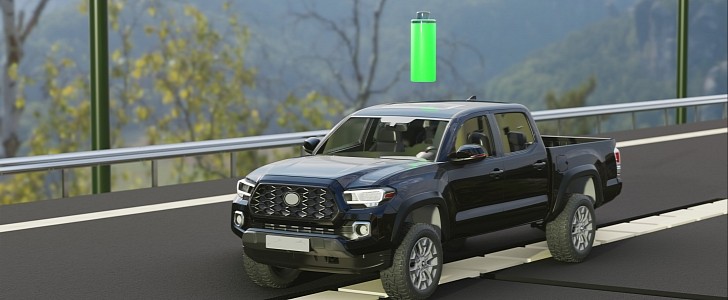Motor Bella, an outdoor event operating in place of the Detroit Auto Show, was the scene of some interesting news as Michigan Gov. Gretchen Whitmer announced that the state would be the first roll out wireless electric vehicle charging built into roadways.
Think of it like those cradles you can lean your phone on to charge. This system would allow EVs to charge as they’re driving and avoid stops to recharge at dedicated stations.
While the plan was woefully short on details, Whitmer did say that Michigan is seeking partners to help develop and install such technology. But Michigan is facing competition when it comes to the plan as the Indiana Department of Transportation has already announced such as initiative in July of this year. INDOT is already working with Purdue University and German firm Magment on exactly that sort of system.
Magment’s technology makes use of a concrete medium that features magnetic particles embedded in the slurry to wirelessly transmit energy to EVs - and it does it while the vehicles are on the move.
Magment says their optimized magnetics design can be fully integrated into industrial floors during construction, offers continuous and consistent power transfer, does not require overlapping or double coils, and is suitable for static and dynamic charging systems.
The current system to charge EVs relies to a large extent on home-based vehicle charging stations. But this sort of infrastructure would provide a major boost to the range and practicability of EV vehicles.
The INDOT project plans to test the concrete mixture and systems in the lab, and it’s then expected that Purdue engineers will move on to testing the plan, analyzing the results, and then suggesting tweaks to optimize the technology on the road.
INDOT says Phase 3 of the project will involve building a quarter-mile-long test road to assess the practicality of moving a charge to commercial trucks that operate at 200 kW and above. Should the results of those tests prove satisfactory, INDOT says the technology will be used to electrify a stretch of interstate highway somewhere in Indiana at a location to be determined later.
While the plan was woefully short on details, Whitmer did say that Michigan is seeking partners to help develop and install such technology. But Michigan is facing competition when it comes to the plan as the Indiana Department of Transportation has already announced such as initiative in July of this year. INDOT is already working with Purdue University and German firm Magment on exactly that sort of system.
Magment’s technology makes use of a concrete medium that features magnetic particles embedded in the slurry to wirelessly transmit energy to EVs - and it does it while the vehicles are on the move.
Magment says their optimized magnetics design can be fully integrated into industrial floors during construction, offers continuous and consistent power transfer, does not require overlapping or double coils, and is suitable for static and dynamic charging systems.
The current system to charge EVs relies to a large extent on home-based vehicle charging stations. But this sort of infrastructure would provide a major boost to the range and practicability of EV vehicles.
The INDOT project plans to test the concrete mixture and systems in the lab, and it’s then expected that Purdue engineers will move on to testing the plan, analyzing the results, and then suggesting tweaks to optimize the technology on the road.
INDOT says Phase 3 of the project will involve building a quarter-mile-long test road to assess the practicality of moving a charge to commercial trucks that operate at 200 kW and above. Should the results of those tests prove satisfactory, INDOT says the technology will be used to electrify a stretch of interstate highway somewhere in Indiana at a location to be determined later.







